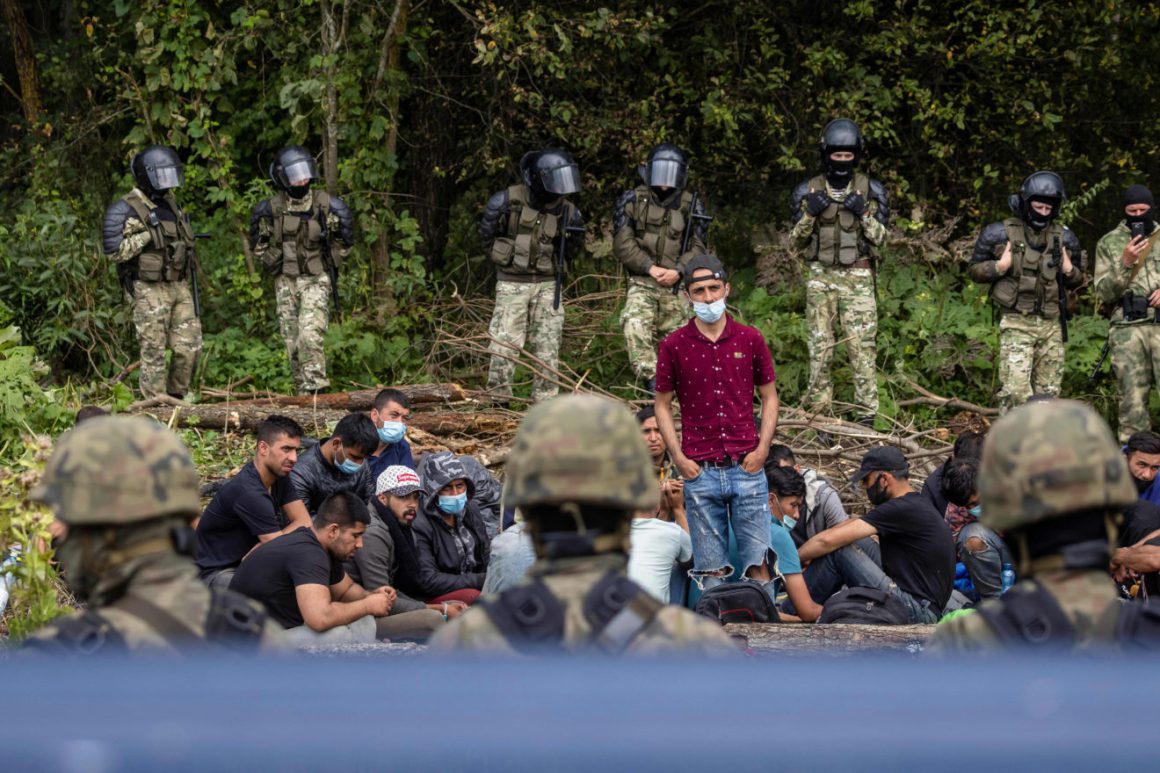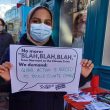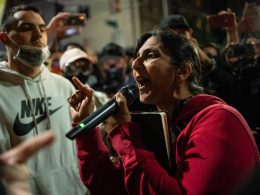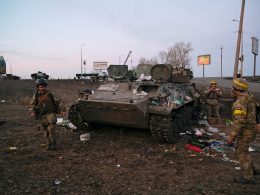Joint statement by ISA members from Poland, Belarus, Syria and Russia about the crisis on the Belarusian-Polish border as thousands of refugees have been caught in a no-man’s land between the two countries on the edge of the European Union.
For weeks now a crisis has been building on the Belarusian-Polish border as thousands of refugees fleeing from war and conflict in Syria, Iraq, Afghanistan, Yemen and elsewhere have been caught in a no-man’s land between the two countries on the edge of the European Union. On 16 November clashes broke out as Polish police used tear-gas, water cannons and possibly stun-grenades against the refugees.
Thousands of Belarusian border guards are pushing the refugees forward. Two nuclear capable aircraft and Russian paratroopers have been moved into Belarus. On the Polish side a state of emergency in the border regions has been declared policed by 15,000 soldiers with engineering support provided by the British army. The British presence is seen as a snub to the EU, as the Polish government has refused help from the latter’s “Frontex” border force. Latvia and Lithuania too have sent 3,000 and 5,000 troops respectively to their borders with Belarus, and have started to build hundreds of kilometers of 3-meter high razor wire walls along them.
Hellish conditions
Conditions are hellish. Many of the refugees are living in the forest in sub-zero temperatures. They report having no food and having to drink from rivers. Belarusian border guards are trying to force thousands into a 3-kilometer wide exclusion zone behind a razor wire border fence established by Polish police leaving them in a twenty-first century limbo. One Kurdish refugee described how the Belarusian guards “hit us with sticks of wood, they were kicking and punching us, not just me but also women and children” to stop them moving back into Belarus.
In this exclusion zone, martial law conditions are in force. Medical and aid workers are prevented from reaching the refugees with food, water, extra clothing, blankets and so on. Journalists are also unable to enter the zone to report the situation, according to the government to ensure their safety. Jaroslaw Kaczyński, head of the ‘Law and Justice’ party claims this is because a large part of the media simply repeats Lukashenko’s propaganda, although actually they are just exposing the brutality and illegality of what the Polish state is doing. Despite the zone being a serious violation of civil liberties, with restrictions on movement imposed on Polish citizens, the authorities allow hunting with guns near the border! This is interpreted on the Belarusian side as giving a green light to hunt down refugees.
A Syrian refugee who had been drinking dirty water and eating scrapings from trees tried to cross back into Belarus three times but was beaten by border guards — eventually he was so ill Polish police had to send him to hospital, where he now fears their return, as they will send him back to the exclusion zone. Other reports indicate that Polish border guards have used electroshocks against the refugees. When the first refugees died in the Polish woods their bodies were dragged back across the border to Belarus by Polish guards.
The number of refugees who have died has already reached double figures, and as the weather gets rapidly colder, is likely to grow. This includes an unknown number of children. They and their mothers are facing particularly dire conditions. According to one paramedic: “The first time we saw children in the woods, we were shocked. We saw a woman crouching down while breastfeeding a small baby in the middle of the night, and another three-year-old child standing next to her. We couldn’t get this picture out of our minds: a lost, abandoned breastfeeding woman with two children in a cold forest in the middle of nowhere”. There are reports that women and children are pushed to the front in effect to act as a human shield.
Crisis caused by imperialism
As in the 2015 crisis, this wave of refugees results from the devastation and violence caused by imperialist interventions in Syria, Iraq and Yemen. The recent humiliating withdrawal of US imperialism after its twenty-year occupation of Afghanistan has left even more trying to escape from the worsening conditions of repression and the threat of famine.
The real situation in Syria, for example is highlighted by the 2-day Russian backed conference held in Damascus last week with the aim of ‘facilitating the return of millions of Syrian refugees” to the country. Many countries refused to attend whilst the European Union declared that “the situation in Syria was not yet safe for returns”. The Russian intervention in Idlib created a refugee crisis there, while Turkey created problems in other parts of North Syria. Western imperialism and the Assad government managed to make refugees all over the country.
Where there is war, there will always be refugees, particularly those that are trying to avoid the fighting. Some Syrian Oppositions who now side with the counter revolution says that the refugees now stuck on the border should not be helped because they were not involved in the stand against Assad. We reject the argument that the refugees do not deserve support because they have not joined the opposition to Assad. Many who did not do so were motivated by their distrust of the right-wing Islamists and other reactionary forces in the opposition. This is a humanitarian crisis that requires a solution based on the unity of workers and the poor.
The focus of imperialism and the EU in particular has not been on solving the humanitarian catastrophe, but on preventing refugees from reaching the European Union. In trying to escape, refugees have fallen victim to outright exploitation by the capitalist system itself. Black marketeers have sprung up offering visas and travel at extortionate prices. They act without scruples.
One group from Syria each handed over $5000 to a ‘middle-man’ in Damascus for a package tour supposedly including a ten day stay in a Minsk hotel. Once in Belarus, their contact cut off communications with them. “The bastard lied to us” was the comment of one of them. “He promised a hotel for 10 days, but 10 of us were huddled in a tiny room next to a brothel for only three nights. And now he has stopped answering his phone.” Hotels are charging thousands of dollars to stay — as one hotel administrator commented: “It was very quiet during the pandemic. Tourists stopped coming, but now it’s busy every day. It’s good for business”. Taxis are charging hundreds of dollars for journeys to the border.
But there are others who do not see this humanitarian crisis as a source of profit. Families on the Polish side of the border are displaying green lights to indicate they are prepared to feed and give warmth to desperate refugees. In recent months, German cities and regions such as Munich have said they are prepared to accept refugees from Afghanistan. Lukashenko is taking advantage of this by saying he can arrange a direct flight for refugees to Munich. Those who arrived in Germany after the previous crisis however have not found life easy. Only half have obtained paid employment, a situation that has been made worse by the pandemic, while many have suffered xenophobic attacks.
Fortress Europe
Nevertheless these attempts to help are in stark contrast to the approach of EU officials, who focus on strengthening “Fortress Europe”. When Hungary’s Viktor Orban in 2015 built a wall to stop refugees entering Hungary, the massive public sympathy for the refugees forced the EU to criticise him. Today, governments in the bloc openly support the common funding of external walls and fences. Already the length of planned border walls in Eastern Europe has reached 1200 kilometres — eight times the length of the notorious Berlin wall!
The refugees are finding themselves in the middle of the conflict between the imperialist powers. At one level this is a war of words. Belarusian President Lukashenko accuses the West of waging “hybrid warfare” against his country, a claim that is echoed by the Polish government against him, while European leaders accuse him of “weaponizing” the crisis. This is annoying refugees: they deny being “weapons”, they are, they say, human beings “here for life, not for fighting.” The regimes on both sides of the fence are treating the refugees as if they have no rights, a problem to be resolved. But the refugees themselves must have a say in their own future.
This crisis reflects the contradictions developing with the European Union itself. Poland’s right populist anti-immigrant government has recently pushed through its Constitutional Court a decision declaring that Poland’s laws take supremacy over those of the European Union.
But on the border dispute, the EU is fully behind the Polish government’s anti-immigration stance supporting the attempts by Polish police to push immigrants back into Belarus. This is in direct conflict with international law and the EU’s recently amended asylum policy which promises a swift decision on asylum status and a pre-entry screening process. This should be no surprise because the EU has already supported the push-back of refugees attempting to cross the Mediterranean Sea and in its dealings with Turkey’s President Erdogan. The EU is not governed, as it claims, by ‘humanitarian values’, but is using the refugees as pawns in its power struggle with Lukashenko and Putin. It is also quite aware of the undemocratic and increasingly authoritarian nature of the Polish government, but is quite happy to turn a blind eye to this, as the regime does its “dirty work”.
Lukashenko’s blackmail
There is little doubt however that authoritarian Belarusian President Aleksandr Lukashenko has been stoking the crisis. The ‘tour agencies’ that have been encouraging refugees to travel to Belarus have official support and even use a simplified visa application procedure. Many have flown to Minsk on flights by the state owned Belavia airline, although it has now announced it will not convey passengers from Iraq, Syria and Yemen. Once in Minsk refugees have been helped to travel to the border and it is reported that Belarusian troops have used lasers and strobes to distract Polish guards as the refugees have tried to break through.
In part the crisis is acting as a diversion from the real problems of Belarusian society after last year’s uprising against Lukashenko. After the failure of the movement to remove him, massive repression has raged across Belarus. Thousands of opposition activists have been arrested, others have been sacked while many have fled abroad to countries like Poland and Lithuania. Lukashenko’s character is such that he quite clearly sees this situation as a chance to wreak revenge on Poland and the EU for their support for the liberal bourgeois opposition who headed last year’s protests. But he is also using it to pressurize the EU to lift the sanctions it has imposed with the argument that if the EU takes further action, he will unleash a wave of refugees. His current actions have the added benefit that Belarus’s borders will be more difficult to cross for opponents attempting to escape his wrath.
Russian support
While behind Poland stands the EU, behind Belarus is Russia. Tensions between the imperialist powers have increased dramatically in recent months. In July a Russian aircraft even dropped four bombs to head a British ship off its course in the Black Sea. Arguments continue over the supply of Russian gas to Europe, and the NordStream 2 pipeline has again been refused certification by Germany. NATO, CIA chief and senior British figures, as well as US Secretary of State Antony Blinken have been sabre-rattling over the threat posed by Russia to Ukraine, statements which are used by the Kremlin to whip up anti-western feeling domestically.
The Kremlin has demonstrated several times that it is prepared to launch military attacks to divert attention from domestic problems. There are currently many. It has seen a devastating fourth wave of the pandemic with one of the highest death rates in the world, whilst the economy and living standards are stagnating. At the current time, however, the military, economic and social costs of an attack on Ukraine would be too great for the Kremlin to take an unnecessary risk. Instead, it would rather use its current military build-up on the Ukrainian border, and its support for Lukashenko to pressurize the West in the hope of preventing it from taking further action.
At the same time the process to resolve the frozen conflict in East Ukraine has made no progress. Populist Ukrainian President Volodymyr Zelinskiy has seen his approval ratings fall to record lows and his support within the ruling elite wither away. He promised to resolve the conflict with the two break-away republics Donetsk and Lugansk by the next Presidential election in 2024 and he is being pressurised by Ukrainian hawks to provoke Russia into a military confrontation. The instability in the region is demonstrated once again by a new spate of fighting over Nagorno-Karabakh this week.
In the same way, Russia does not want Lukashenko to go too far in his conflict with the West, particularly if it affects the Russian economy. When Lukashenko threatened to cut off gas supplies to Europe, the Kremlin quickly denounced the threat. The fear in the Kremlin is that Lukashenko has created a problem for himself, that he cannot back down from this confrontation without losing face. As Lukashenko said at one government meeting: “They frighten us with sanctions. Well good, let’s see. They think I am joking, am just flapping my tongue. Nothing of the sort. We will defend ourselves. That’s all, we have nowhere to retreat to”.
If Lukashenko was to lose the confrontation, and the liberal opposition is strengthened, then Russia may even be forced to intervene in Belarus itself.
Our demands
As with most crises that currently grip the world, this is one that is complex, intensely international and at root caused by capitalism and imperialist conflict. To end the current crisis, we need solidarity and organization to demand:
- The immediate provision of food, clothes, shelter and medical services for all those currently trapped on the border;
- Freedom for journalists to report from the region, including within the border zone and with the reinstatement of all journalists sacked by the Belarusian regime;
- The withdrawal of the border guards, troops and police from both sides of the border and the lifting of the exclusion zone, to allow humanitarian organisations to assist the refugees and manage their safe passage to shelter and warmth;
- International support organised and controlled by trade unions, refugee and human rights organisations, as well as the refugees themselves and the local population to organise and monitor the process of demilitarisation of the border region and manage aid for the refugees;.
- The immediate acceptance of these refugees entering the European Union, with the rapid examination of all asylum applications and granting of refugee or other legal statuses, enabling uninhibited travel to the country of their choice;
- The provision of homes and stable jobs, access to education and health care for everyone.
These are demands however that address the immediate problems of those suffering on the Belarus/Polish border.
We reject any attempts to play off refugees against the domestic population. The money used for the military and police apparatus to “secure” the borders should be used instead to ensure the safety of the refugees. The profits made by the oil companies and arms manufacturers from conflicts in the Middle East should be taken over and used to rebuild the economies of that region.
The wealth of the rich in Europe and internationally generated by the exploitation of poorer countries and the working class globally should be used for the benefit of all. We understand that this is not an “easy” solution — but it is the only real solution as, without a radical economic and social transformation of these countries, no border, no police, no razor wires will be enough to stop desperate refugees from trying to get away.
Sanctions that are currently used by US and EU imperialism against the authoritarian regimes of Belarus, Russia, Syria, Iraq are ineffective, damaging the living standards of working people and youth, while barely affecting the ruling elite. They allow the regimes to depict the country as politically ‘under siege’ by Western governments, whilst blaming economic difficulties on the sanctions themselves. Effective sanctions would start with the opening of the accounts of the rich and ruling elite from those countries to reveal who their friends and collaborators are in other countries, with the expropriation of their riches. This will only be possible through the independent action of the global workers’ movement.
Indeed a wider working class struggle based on international solidarity is needed against the root cause of this crisis — against the authoritarian rule of Aleksander Lukashenko in Belarus and reactionary “Law and Justice” government in Poland, as well as against the imperialist policies of the US, EU, Russia and others that have caused the catastrophe in countries such as Syria, Iraq, Afghanistan and Yemen — in other words a struggle against global capitalism and for an international and democratic socialist society.












